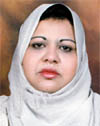
Tahani Saeed to YT: Weve got a long way to go, [Archives:2002/24/Culture]
June 10 2002

It also deals with women and the environment, women in decision-making, women and poverty and media.
The CSO did a household survey in 1998, a poverty survey in 1999 and labor-force survey in 1999. The CSO collects and then analyzes this data to show men and women statistical portraits. Tawfeek M. Sharaabi met with Mrs. Tahanee and filed the following interview:
Q: What is your departments role?
A: Our department role is confined to collect data and analyze it, providing all bodies concerned and interested with them. We help guide women organizations to points of limitations and problems and they take over by conducting projects and more studies to address problems. The department is not in a position to hold training courses and workshops, mainly because of the limited support.
In 1997, there used to be some support to prepare the report on the situation of men and women. The support was over as soon as the report was prepared. The second report was self-motivated and partly supported by the CSO. In 2001, we published the second report. Now we are planning to publish a small booklet in Arabic and English which will include the important recent data collected recently.
However, we have contacts with women local and international organizations. As we coordinate with other women organizations, including Women National Committee (WNC) which hold such courses and workshops on a regular basis.
Q: What are the major obstacles facing Yemeni women?
A: There are many obstacles and problems facing Yemeni women. Illiteracy is one of the major ones. Illiteracy among women is higher than that among men. It is attributed to traditions. Some families in rural areas prefer to teach the boys rather than the girls. They believe girls should stay at home following marriage. Girls school enrollment is far less than that of boys. Another obstacle is that schools are sometimes far way from villages. Moreover, there are no schools for girls in some rural areas. Early marriage is another obstacle.
Q: How do you assess the situation of women with regard to poverty, health and the labor force?
A: Regarding poverty, reports show that many women run the household. They may be divorced or widowed. These families are even poorer. Thirty percent of families in Yemen are supported by women. They are the breadwinner for their families.
In health, we find that the maternal mortality rate is very high, about 800 to 1000 per 100,000. This is of the highest rates all over the world.
Womens participation in the labor force is still very low, about 22 percent in comparison to men. Moreover this 22 percent is restricted to some restricted fields such as education and nursing. Another problem is that most women working in rural areas do work for their families with no payment.
However, there is a remarkable improvement in the situation for some women. Girls enrollment is going up. In health production, the situation has also improved. Women had a fertility rate in 1994 of 7.3 percent. Now the rate has slightly decrease. This was attributed to family planning.
Q: What about the issues of domestic violence against women?
A: In the 2001 report, it came out that 30 percent of women suffer domestic violence in terms of bad treatment by the father, brother or husband. There are various forms of domestic violence including girls circumcision and forced marriage. The report showed that 22 percent of women were circumcised. Studies showed that this phenomenon is much spread in coastal areas: in Mahrah, Hadhramout Aden, and Hodiedah. This is attributed to emigration to Yemen. However, there is some improvement now.
Q: How do you find the role of women organizations in addressing women issues?
A: There are many pioneer organizations which are doing a great job to address women issues, including WNC, Women Rights Forum, Women Studies Center, Sisters Forum, Altahadee Organization, Yemeni Women Union and others. However, there are other organizations which are doing nothing for women.
Women organizations should not focus on holding workshops only. They also should think of support and improving the living standards of women. Some organizations are doing commendable efforts in this regard such as granting loans.
Q: What about the situation of women prisoners?
A: The non-existence of pending investigation offices is a major concern for us and women organizations in general. We requested in many seminars held for the establishment of such offices. However, nothing has changed in the Capital Secretariat let alone other governorates.
Another problem is that there are some women prisoners with their children. This obviously has a very negative impact on children and their growth.
Q: How do you think the Human Rights Ministry can support women?
A: The ministry can play a pivotal role in this regard. However, the fact is that the ministry is still in its infancy. The Human Rights Minister has actually been working on setting up the ministry organizational structure. The ministry could be a great catalyst for women rights, especially as the minister is Dr. Waheeba Farae. Since its establishment, the ministry has achieved remarkable progress. However, we do believe that if the ministry go on with the same pace it will accomplish many achievements for men and women in general.
Q: Any last word?
A: We appreciate the Yemen Times focus in women issues as we hope to coordinate with each other to shed more light to help address womens rights in our society.
——
[archive-e:24-v:2002-y:2002-d:2002-06-10-p:./2002/iss24/culture.htm]


